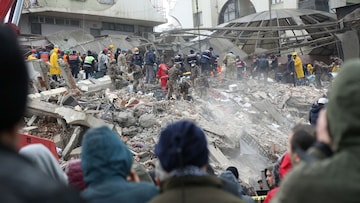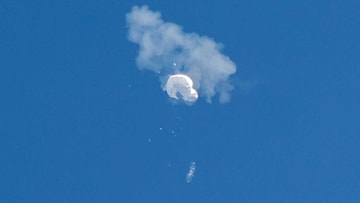
Many significant events have shaped global developments. Notable occurrences include India surpassing China as the world's most populous country, Henry Kissinger's death and the Hamas-Israel conflict. Here's a recap of all major world events in 2023.

Palestinian militant group Hamas executed a significant attack on Israel in the early hours of October 7. The attack, which came at the 50th anniversary of the Yom Kippur War, is regarded as one of the worst Israeli intelligence failures since its creation in 1948.
According to the Israeli government, more than 1,200 people have lost their lives in Israel with 6,900 others injured. The Israeli Defence Force (IDF) said 383 soldiers have been killed since the October 7 raid. Israeli authorities also say that Palestinian groups also took more than 240 people captive during the attack, some of which have been released in truce deals later.
“Hamas’s attack on Israel on October 7 is the third-deadliest terrorist attack since data collection began in 1970, based on the number of fatalities, with the 9/11 attacks representing the worst mass fatality terrorist attack,” Australian think tank CSIS observed.
Tel Aviv responded by pounding the enclave with a relentless bombing campaign which has left nearly 20,000 Gazans dead. It also cut off access to food, electricity, and fuel for the more than 2.3 million residents of the Gaza Strip.

2) India becomes world’s most populous country
2023 witnessed India surpassing its neighbour China to become the world's most populous country, boasting an estimated population of 1.43 billion people. Projections suggest that India is likely to maintain this status for decades to come.
“In April 2023, India’s population is expected to reach 1,425,775,850 people, matching and then surpassing the population of mainland China,” the UN Department of Economic and Social Affairs observed in a report.
“In 1971, China and India had nearly identical levels of total fertility, with just under 6 births per woman over a lifetime. Fertility in China fell sharply to fewer than 3 births per woman by the end of the 1970s (figure 3). By contrast, the fertility decline in India has been more gradual: it took three and a half decades for India to experience the same fertility reduction that occurred in China over just seven years in the 1970s,” it added.
According to the Pew Research Centre, India's population has grown by more than one billion people since 1950- the year the UN started gathering population data. This comes as China's population, in 2022, shrank for the first time since 1960. Amid declining population and below replacement rate fertility, Beijing ended its strict "one-child policy", imposed in the 1980s in 2016 and started letting couples have three children in 2021.

3) G20 Summit
India emerged as the leader of the global South in the year 2023. Not only successfully hosting this global summit, but India also managed leaders with disparate views on a single platform to issue a statement. Indian under its presidency ensured it became the voice for the African nations with the induction of the African Union as a permanent member of the G20.
India organised its inaugural G20 Leaders' Summit on September 9-10. The summit saw the participation of 43 heads of various governments, including US President Biden, Canada PM Justin Trudeau, and British PM Rishi Sunak. Under the theme “One Earth, One Family, One Future,” the G20 leaders discussed several important topics of global concern.
“During the presidency, India is focused on various issues like inclusive growth, digital innovation, climate resilience, and equitable global health access. By leveraging its presidency, India is fostering collaborative solutions that not only benefit its own population but contribute to the broader global well-being, reinforcing its spirit of Vasudhaiva Kutumbakam or the World is One Family,” the centre said.
“We are determined to steer the world out of its current challenges and build a safer, stronger, more resilient, inclusive and healthier future for our people and the planet,” G20 New Delhi leaders’ declaration.

4) Russia Mutiny
The chief of Russia’s Wagner Private Military Company, Yevgeny Prigozhin, staged a short-lived mutiny on June 24 this year. His act pushed the Vladimir Putin regime into an unprecedented internal security crisis. Leading a convoy of armed men and armoured vehicles towards Moscow, he demanded the ouster of Russia’s top defence brass.
His move created alarm elsewhere after news of the takeover of Russia’s Southern Military District headquarters in Rostov-on-Don, the largest city in southern Russia, surfaced.
However, Prigozhin abruptly ended his so-called "march of justice" after Belarus's Alexander Lukashenko brokered a deal to allow him and his forces to come to his country. Prigozhin was later killed in August in a plane explosion in Russia.
Russian president Vladimir Putin's right-hand man, the country's Security Council secretary Nikolai Patrushev- ordered the assassination of Wagner mercenary group chief Yevgeny Prigozhin, the Wall Street Journal (WSJ) reported citing Western intelligence and a former Russian intelligence officer.

5) Henry Kissinger's death
2023 witnessed the deaths of many key global figures, from Pakistan’s last dictator President Pervez Musharraf to former Chinese Premier Li Leqiang. One among this list included the former US Secretary of State and National Security Adviser (NSA) Henry Kissinger.
The scholar-turned-diplomat presided over several historic events during his tenure including engineering the United States’ opening to China, negotiating the US exit from Vietnam, and detente with the Soviet Union at the height of the Cold War. With his shuttle diplomacy, he edged Moscow out of its standing as a major power in the Middle East.
Kissinger advised 12 presidents during his lifetime — more than a quarter of those who have held the office — from John Kennedy to Joe Biden.
He joined the Nixon White House in January 1969 as NSA. He kept this title along with Secretary of State after 1973, a rarity. When Nixon resigned, he stayed on under President Gerald Ford.
He later negotiated the peace accords that ended the American involvement in the Vietnam War for which he won the 1973 Nobel Peace Prize.
He is often regarded as one of the most powerful Secretary of State of the postwar era who shaped the nation’s Cold War history.
“Henry Alfred Kissinger, one of the most influential statesmen in American history, died on Nov. 29 at age 100 after a long and tumultuous career in which he helped author some of the greatest triumphs — as well as some of the most tragic failures — of US foreign policy,” Foreign Policy columnist Michael Hirsh wrote.
“In the view of some biographers, Kissinger ranks in stature with George Kennan, the principal author of America’s successful Cold War containment strategy, as well as with other hallowed architects of the post-World War II global system,” he added.

6) BRICS Summit
The BRICS (Brazil, Russia, India, China, and South Africa) bloc met for its annual leader’s summit in Johannesburg on August 22–24. The BRICS summit is seen as one of India's biggest geopolitical wins of 2023. India was one of the key players in the admission of six new member countries: Argentina, Egypt, Ethiopia, Iran, Saudi Arabia, United Arab Emirates (UAE). These global South countries will officially join the group in January 2024.
However, in a new twist now, Argentine President Javier Milei has sent letters to leaders of member nations informing his withdrawal from the planned entry into the group. He said “his foreign policy differs in many aspects from that of the previous government. In this sense, some decisions made by the previous administration will be reviewed."
The BRICS bloc is often seen as a counterweight to the Western-led world. The “BRIC” term was given by then Goldman Sachs economist Jim O’Neill in 2001. The main purpose behind the term was to throw a spotlight on the strong economic growth rates in Brazil, Russia, India, and China.
The BRIC members held its first leaders' summit in 2009 in Russia. Later, South Africa joined the grouping a year later.
“BRICS is essentially a movement of ‘emerging economies’ and thus gives a salience to economic issues, but given the geopolitical flux especially after the war in Ukraine, this BRICS summit takes on a new importance,” Noted Suhaisini Haider in The Hindu.
Russian President Vladimir Putin again gave a skip to the summit due to a pending warrant against him over alleged war crimes in Ukraine.

7) Iran-Saudi detente
There was another key development that dominated the news cycle for weeks before the Israel-Hamas war dominated news cycle coming out of West Asia.
China managed to broker a surprise detente between Iran and Saudi Arabia in March. The duo have a history of centuries-old rivalry originating out of the sects of religion they represent.
The bitter rivalry between Sunni Saudi and Shia Iran has destabilised several Middle Eastern countries, including Iraq, Syria, Lebanon, Yemen and Bahrain.
China’s top diplomat Wan Yi has said that a Chinese-mediated detente between Iran and Saudi Arabia was driving a “wave of reconciliation” in the Middle East.
Wang pledged to “continue to support countries in the Middle East in exploring a development path that suits their own national conditions, strengthening communication and dialogue, adhering to unity and self-improvement, and realising good-neighbourliness and friendship”, Xinhua said.
As per some regional reports, Iran’s Supreme Leader Ayatollah Ali Khamenei wanted to end the nation's political and economic isolation on the global stage following the US withdrawal from a landmark deal.
The two countries have moved towards reopening diplomatic missions. However, some speculation that Iran chased the Hamas’ attacks to derail Israel-Saudi talks may destroy the desired result.

8) Turkey and Syria Earthquake
In February, West Asian nations Turkey and Syria experienced powerful earthquakes. measuring 7.8 magnitude, followed by a second one of 7.5 magnitude. The strong earthquakes were accompanied by numerous strong aftershocks that led to building collapses.
The first earthquake in Turkey was the strongest in more than 20 years and was as strong as one in 1939, the most powerful recorded there. It was centred near Gaziantep in south-central Turkey.
“The earthquakes that struck Türkiye and Syria caused one of the biggest disasters to impact the region in recent times. Tens of thousands of people have been killed and many more have been injured. Thousands of buildings have collapsed, leaving countless people exposed to unforgiving winter conditions. Schools and hospitals have been destroyed. The earthquakes struck as the humanitarian crisis in northwest Syria was already at the highest level since the conflict began, with 4.1 million people relying on humanitarian assistance to subsist,” UN observed in a report.
Countries and other international organisations were quick to respond to requests for international assistance, deploying rescue teams and offering aid.
The World Health Organization (WHO) sent health supplies to 400,000 people impacted by the earthquake whereas the UN World Food Programme (WFP) delivered food assistance to almost 1.7 million people in the two countries.
The devastating impact resulted in a death toll of 59,000 in Turkey and 8,000 in Syria.

9 ) Chinese spy balloon
A Chinese spy balloon traversing the United States for a week in February 2023 dominated global headlines for several days. The balloon, detected over Alaska on January 28, crossed over some of the critical military facilities of the World’s most powerful military including the Malmstrom Air Force base in Montana, a location housing nuclear assets.
The controversy resulting from this incident ultimately forced the USAF to dispatch a fifth-generation F-22 fighter armed with an AIM-9X Sidewinder missile to intercept the balloon over water.
China, on the other hand, continued to insist that it was a weather balloon engaged in meteorological research that inadvertently drifted into US airspace due to weather patterns.
Recent revelations by the American media highlight that US intelligence agencies found that the Chinese surveillance balloon used an American internet service provider to send short, periodic transmissions of data related to navigation and location. The internet service provider remains unidentified.

10) Titan Submersible incident
On June 18, 2023, the submersible named Titan disappeared in international waters in the North Atlantic Ocean near the coast of Newfoundland, Canada. It had five people onboard.
The US Coastal Guard later confirmed that all five passengers onboard had died as the vessel was subject to "catastrophic implosion". The debris of the submersible has been found around 500 meters away from the bow of the Titanic.
Those aboard Titan for a tourist expedition included British billionaire Hamish Harding, Pakistani-born businessman Shahzada Dawood, French explorer Paul-Henri Nargeolet, and Stockton Rush, founder and CEO of OceanGate Expeditions.
(Edited by : Jerome Anthony)
Check out our in-depth Market Coverage, Business News & get real-time Stock Market Updates on CNBC-TV18. Also, Watch our channels CNBC-TV18, CNBC Awaaz and CNBC Bajar Live on-the-go!


Supreme Court says it may consider interim bail for Arvind Kejriwal due to ongoing Lok Sabha polls
May 3, 2024 4:57 PM
10% discount on fare on Mumbai Metro lines 2 and 7A on May 20
May 3, 2024 2:40 PM

